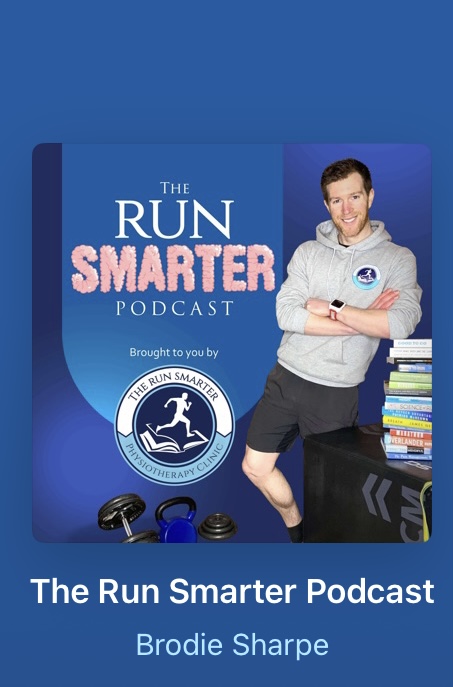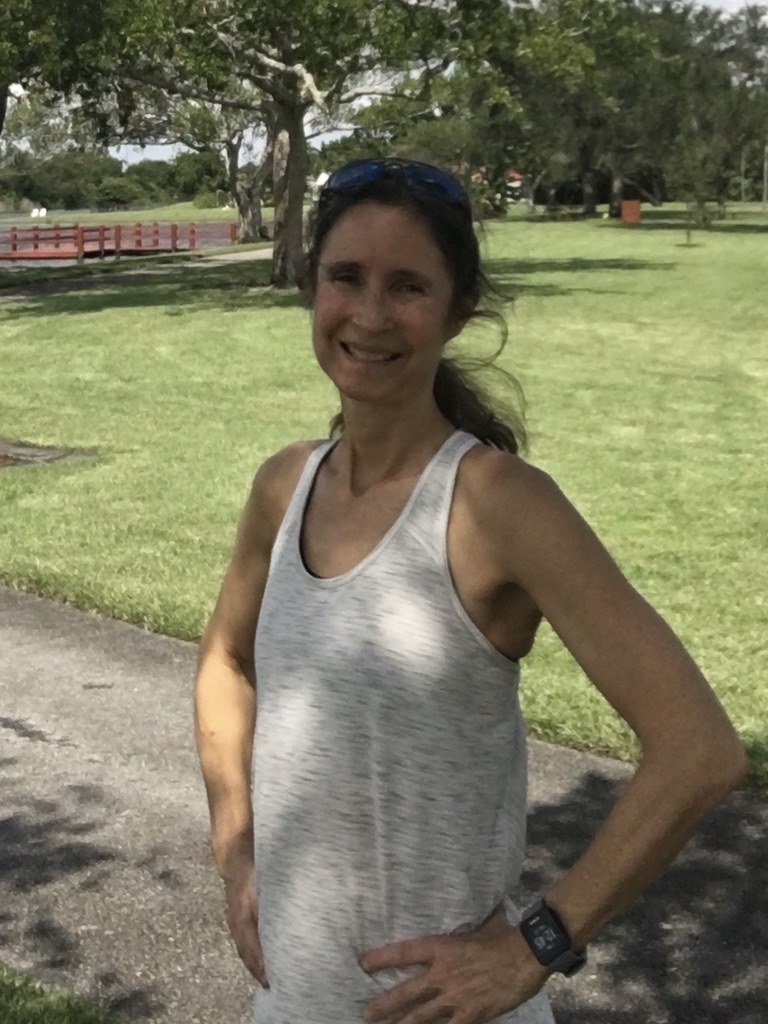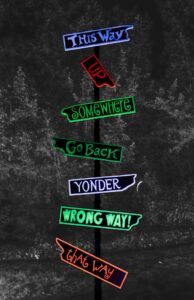Between running, walking, and cross training, I’ve had a lot of time to listen to podcasts lately. My newest one is The Run Smarter Podcast with Brodie Sharpe. Brodie is an Australian physiotherapist and the mission of his podcast is to educate people on the science behind all topics running. I like how he refers to each episode as a “lesson” and greets his audience with “Hello, running scholars!” I feel smarter already!
I recently listened to this episode, “Glute Activation Myths with Rich Willy.” Rich is a physical therapist and PhD Running Researcher (that sounds like a fun job!) He and Brodie debunk the stories we’ve all been told about how weak glutes cause injuries, how we need to “wake up” our glutes, and how everything in running revolves around glutes.
Basically it’s all a load of BS, although they do get into the reasons why this theory became so popular. Rich explains that when you run, your calf muscles (gastrocs and soleus) are actually responsible for 50% of the muscle load. Quads and hamstrings have their roll, and glutes only make up about 15% of the equation (unless you’re running uphill- then the glutes naturally kick in more.)
Running is basically a series of hops, and most of the power comes from the spring-like motion of your tendons (mainly, the achilles.) The glutes don’t have as much tendon as your calf muscles, and therefore don’t supply as much power.
So what’s behind this glute craze we’ve all been subjected to? Well… there were studies done on runners who had knee injuries, and they found that their glutes were “weak.” Aha! They must have gotten injured because of their weak glutes! But further studies showed that the opposite is true- when a runner sustains an injury, the glutes on that side are unwilling to exert as much force, probably as a protective response to the injured area. It’s not that they’re weak, and once the injury is resolved they’re once again willing to take on an appropriate load.
Rich also disabuses us of the notion that if you sit too long, your glutes will “go to sleep” and will need to be activated again. He pointed out that just in standing up, you’re using your glutes. They’re not asleep; they’re perfectly ready to work when needed.
There were all sorts of other fascinating topics in this episode, such as what SHOULD you be doing before a run (since we’re not obsessively activating our glutes anymore?) and what kind of strength training is best. I really loved it. I’d totally bought into the “weak glutes” story and have been doing all sorts of glute activations before every run. After hearing this I’m going to stop all that, and focus my strength training at the gym.
Obviously, I highly recommend this podcast. Other episodes cover topics like running cadence, nutrition, shin splints, blisters, injury rehab, and much more. Okay, it’s not an entertaining, laugh-out-loud type of show, but if you’re interested in the science behind running, you’ll enjoy these “lessons.”
I’m linking up with Kim and Zenaida for their Tuesday Topics! Thanks, ladies.
Do you do glute activations before your runs?
Do you like “informational” or “entertainment” podcasts more? – I like both, but skew heavily toward informational.






33 Responses
love the recommendation. i love to learn more about the science of running tips. thanks for sharing.
You’re welcome Coco! I hope you check it out and enjoy the podcast.
Thanks for this! I love everything informational and science-based and there’s a ton of BS out there. I’ve heard a lot about the glutes but have been sceptical about them being “asleep” because I’ve been thinking that if you walk and move, then your glutes are awake. I do quite a few glute exercises but mainly to keep them strong because everything in your legs needs to be strong and stable for running. Right now I’m focusing more on feet and lower legs since I get most of the rest in the gym, but I do some single leg stuff at home.
Before running, I do warmups in the form of hip movements, squats and lunges, and rolling a tennis ball with my foot to relax my calves.
That’s funny- you just used common sense to figure it out, instead of a bunch of studies.
I need to focus more on feet (for my plantar fasciitis) and lower legs (for my calves.)
Wait, what??!!!! So I’ve been terrorized by my PTs all this time for NOTHING?!
Thanks for sharing this, Jenny! I spend quite a bit of time on glute activation before each run.
What should we be doing instead? And what kind of strength training do they suggest? I guess we still should be doing squats and the like, right?
I think we need a follow-up post!
Okay, you’re right. For strength training they said go to the gym and do squats, deadlifts, calf raises (which I haven’t been doing) and something for single leg strength like Bulgarian split squats. And you should be lifting heavy- not light weights or bodyweight exercises. They said if you have a routine that you like before you run and you think it helps, then keep with it- otherwise just some walking and slow running to start are a fine warmup.
That sounds good! Thanks, Jenny!
That sounds good!
I’m glad about the heavy lifting, I think they are spot on with that.
Thanks, Jenny!
All I can say is WHEW! I was worried that all my hard work was for naught!
I listen to chatty, fun podcasts. Other than Press Play and a couple of history podcasts, my podcasts are mostly fun and sometimes thoughtful.
Yes, Hit Play Not Pause is definitely informational and I still listen to it (thank you!)
Wow! I wasted a lot of time as a runner trying to “activate my glutes”. I shoulda known it was BS.
I like a mix of information and entertainment in my podcasts.
Yes, and I feel like I wasted a lot of time worrying about my “weak” glutes. I like how the overall message of this podcast was, just go out and run and don’t worry about it.
I run short distances (hoping to get back to 10K this summer, but we shall see) so I basically do…nothing, but I think it’s awesome that you’ve found a great podcast that is fueling your inside knowledge of the mechanics of running + I LOVE the “Hello, running scholars!” tagline.
It’s funny/interesting/a bit sad how long we can stay fixated on a certain thing only to discover the next wave of research or insights debunks it. Growing up, in my household at least, eggs were a food item to be avoided at all costs because of the fat/cholesterol. Everything was all about keeping things low-fat. But now eggs (and so many other fat-heavy items) are celebrated as a superfood. The research on coffee, wine, *you name it*, constantly fluctuates! Mostly I find this liberating because I feel like it leaves space to eat and exercise intuitively. What feels good? What seems to work? More often than not, I suspect that is the optimal, regardless of what the research says??
Yes, those are great examples. I guess anytime something turns into a “craze” (like low fat eating) we should be examining it pretty closely and looking for new research.
Yes. More podcast listening when not running.
I like both kinds.
No I don’t do anything before or after a run.
I may now.
But my injuries have come as a result of falling.
Yes, your injuries definitely didn’t stem from weak glutes!
I didn’t even know “glute activation” was a thing. I obviously am insulated from all the “science of running” and focus mainly on tying my shoes. Ha.
I tend to listen to chatty comedic podcasts and news podcasts and not much in between. I sometimes feel like informational podcasts feel like homework and I should be taking notes on what people are saying and that’s just not particularly relaxing for me.
Yes, I know what you mean- I don’t like it if there’s so much information, I can’t keep it straight without stopping to take notes.
I don’t listen to podcasts that often but this sounds super interesting! It’s funny that no matter how long you’ve been running, you can always learn something new.
Yes, and un-learn something as well! I guess it just goes to show you should always be checking for the newest information.
I’m not a podcast gal, but this sounds intriguing! My PT has been working my glutes like crazy, BUT she did mention the same thing about our bodies going into “protection mode” when there’s an injury. Seems like our bodies (sometimes) know ourselves better than we do, LOL.
Yes, it is interesting- our bodies usually know what to do.
Oh, I’ll have to check this episode out! I have listened to this podcast before and found it interesting and helpful. I am a bit shocked to hear they don’t believe in glute activation. I can’t think of a concept I’ve heard more about in running!
I know!!! I hope you listen to this episode and let me know what you think.
Oh, this is interesting! I love how there’s always something new to learn!
I don’t do too much for my glutes. They have always been pretty strong so I leave them to their own devices 🙂
Well, it turns out you were right all along! I guess we should all trust our instincts more.
Oh wow, this is interesting! I’ve heard so much about weak glutes and have been told that mine are weak too. I like how there is always something new to learn.
Yes, there’s always something new. I had never heard this, but when I listened to the podcast it made perfect sense.
This is interesting to me because my PT told me that part of the reason I ended up with a labral tear in my hip was because of poor core strength and by core, she meant glutes! She she has been a big proponent of needs to focus on things like glute bridges, clam shells, etc, to prevent a tear on the other side. I need to find the time to listen to this podcast to see if this podcast flies in the face of what she’s told me!
Yes, it does- you should listen to it. They definitely recommend lifting weights, but not things like glute bridges and clamshells.
Hmm. My butt definitely goes numb after I sit for too long — and I have to walk like the tin man to the bathroom! And I do feel like some runs are easier after I’ve done a glute-activating warm-up. But, after all the glute strengthening I’ve done, if weak glutes were the problem I should have an iron-clad guarantee of injury-free running, and sadly that’s not the case.
Yes, I feel the same way! In your case, maybe it’s just that you run better after you’ve warmed everything up. Whatever- if your runs are easier after doing glute activations, I would stick with that no matter what anyone says.